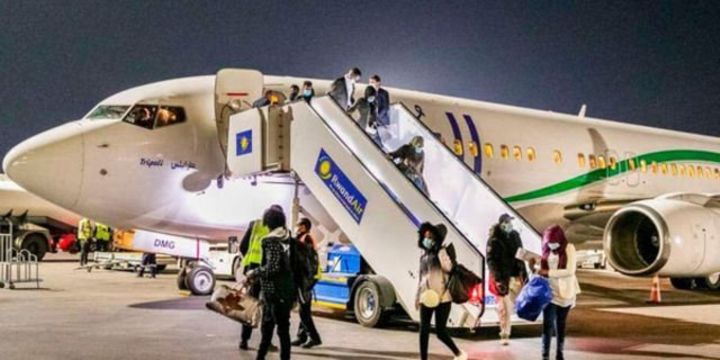
Asylum seekers from Libya arrive in Rwanda in December 2020.
The African Union (AU), the UN refugee agency (UNHCR) and Rwanda are moving to deepen the rescue of asylum seekers from Libya stuck in a spiral of dire conditions in Tripoli detention centres.
The earlier memorandum of understanding signed between the three parties in 2019, which led to the establishment of the Emergency Transfer Mechanism (ETM) centre in Gashora, Rwanda, has proved to be a major respite for the Libyan asylum seeker problem, officials said on Wednesday.
Between September 2019 and February 2024, more than 2,000 refugees and asylum seekers were evacuated from Libya to the ETM in Rwanda in 17 evacuation flights.
However, the problem seems far from being solved, as a large number of Libyan asylum seekers remain in deplorable conditions and the evacuation needs to be accelerated.
“Out of the 55,665 refugees and asylum-seekers registered with the United Nations High Commissioner for Refugees (UNHCR), 4,700 persons of concern are currently estimated to be held in dire conditions inside detention centres in Libya... They urgently need to be moved to safety and to be provided with protection, lifesaving assistance, and durable solutions,” reads a statement shared by the AU.
Under the joint agreement between the AU, UNHCR and Rwanda, with support from the EU, a group of 500 people in need of international protection will be evacuated.
The group consists mainly of people from the Horn of Africa, including vulnerable children and youth. Upon arrival, UNHCR will continue to seek solutions for the evacuees.
While some may benefit from resettlement in third countries, others will be helped to return to countries where asylum had previously been granted, or to return to their home countries if it is safe to do so.
Some may be allowed to remain in Rwanda, subject to the agreement of the relevant authorities.
UNHCR has evacuated more than 4,400 people of concern from Libya to other countries since 2017, including 2,900 through the Emergency Transit Mechanism in Niger and 425 to European countries through the Emergency Transit Centre in Romania.
The refugees and asylum seekers are mainly of Eritrean, Somali, Sudanese, Ethiopian, South Sudanese, Cameroonian, Nigerian and Chadian nationalities.
Once voluntarily evacuated from Libya to Rwanda, refugees and asylum seekers are provided with a range of services and support by UNHCR and implementing partners.
These include an initial health assessment, three meals a day, shelter, 24-hour primary health care and referrals to local hospitals for secondary and tertiary care as needed.
Individuals at the ETM also receive monthly cash assistance to help them meet their basic needs and purchase food and other household items from the local market.
Over 70 percent of asylum seekers and refugees evacuated from Libya have been identified as suffering from psychological distress and PTSD. As a result, UNHCR and partners are providing regular psychosocial counselling and therapy.
In addition, to prepare refugees for life after leaving the ETM, UNHCR and partners organise a range of activities and skills-based training to promote their development and help them regain their dignity.
These include language and computer classes, driving lessons, hairdressing and barbering skills, financial literacy programmes and other skills training.
Once at the ETM centre, UNHCR conducts registration/verification of refugees and asylum seekers, as well as refugee status determination (while unaccompanied children undergo Best Interest Determination assessments) and durable solutions assessments.
Following these case processing procedures, refugees are presented for resettlement to third countries.
Options to return home or integrate in Rwanda are also available, although no refugees have yet taken up these solutions.
To date, more than 1,500 refugees have been resettled from the ETM centre to Canada, Sweden, Norway, Finland, France, Belgium, the Netherlands and the USA.





